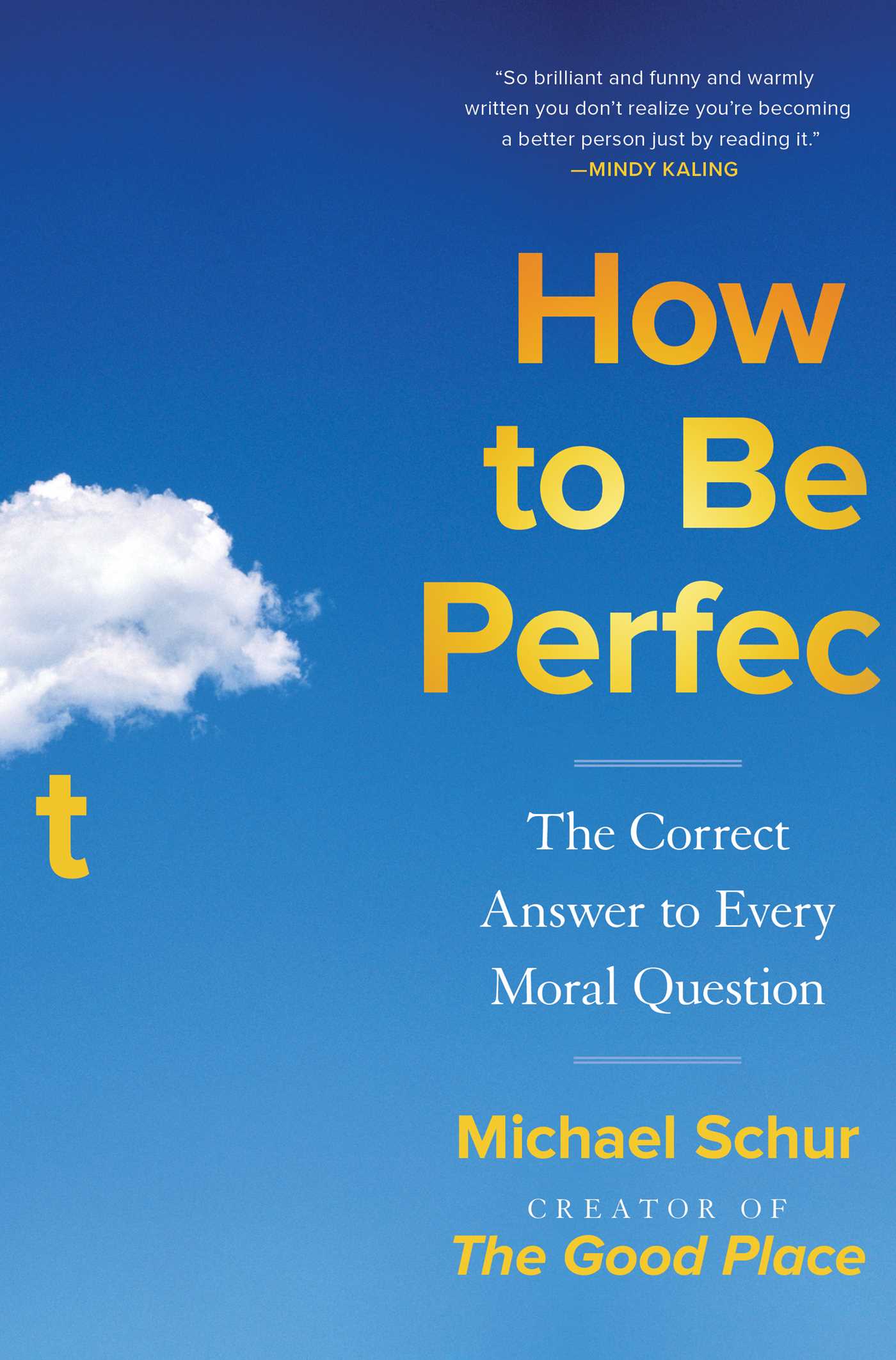Michael Schur, the writer and producer who created Parks and Recreation and The Good Place, wants to help us out. The reading he did on ethics and moral philosophy that eventually led to the latter show imbued him with a strong conviction: that being good is very hard for most people. With that difficulty in mind, he set out to condense this material for his readers, who presumably are mostly also his show’s viewers, and to show them, in the words of his new book’s title, How to Be Perfect.
The premise seems simple enough: a basic orientation in ethics as discussed by philosophers, with the practical aim of giving people a tool kit that might help them think more clearly about what they do and why. But this project has serious problems, the most obvious of which is its strong aversion to sustained thinking of any kind. Yes, Schur is a comedy writer, but that doesn’t excuse the constant joking in the book, mostly because the “jokes” can be called such only under the most expansive formal definition of the term, but also because these pseudo-jokes ensure that no discussion of ideas goes on for too long, or assumes too urgent or serious a tone.

How to Be Perfect
Michael Schur
Simon & Schuster, 2022
But more gravely, Schur sees the project of ethics as one of doing just enough to placate our conscience, and he does not bother to ask whether the ability to do this in the midst of a society built on extraction, dispossession, and murder might be a symptom of deep and lasting moral sickness.
That said, helping philosophy to go down easier isn’t a bad thing, and it isn’t new. In Lucretius’s De Rerum Natura (On the Nature of Things), his six-book epic poem on the motion of atoms and its theological, anthropological, and ethical consequences, he likens his verse to honey smeared on the rim of a cup of “bitter medicine”. The pleasant form of verse makes the bitter medicine of Epicurean philosophy easier to swallow, and ingesting such medicine nourishes the soul.
Schur sets out to do something similar. The structure and unspoken premises of his book, however, stymie this endeavour. Focusing on the level of individual choice, Schur’s “tool kit” approach reduces ethics to a set of glib mottos, instead of the urgent and critical reflection on the significance of human action that undergirds Socrates’s repudiation of the “unexamined life”.
Weird saints
No sweeping overview of moral philosophy can hope to be comprehensive, and one could do worse than Schur’s trifecta of Aristotelian virtue ethics, Benthamite utilitarianism, and Kantian deontology: indeed, these remain the primary schools of thought in Anglophone ethics scholarship today. He supplements these with occasional garnish from other thinkers, although his selection principles are contradictory. In his introduction, Schur notes that he avoided religious writings on ethics, but it’s unclear how one would classify the Andalusian Torah scholar Maimonides or the Vietnamese monk Thích Nhất Hạnh without accounting for the formation of their thought in religious traditions. He does avoid specifically Christian ethical writing, which is a fault insofar as many Christian accounts of virtue ethics are both more developed and more accessible than Aristotle’s, or indeed than Schur’s.
Wider reading in religiously grounded ethical thinking might also have saved Schur’s book from perhaps its most frustrating obsession, the paradox of the “moral saint” whose life revolves around being as good as possible. Such a person, according to both Schur and Susan Wolf, who coined the term, may be unhappy and will certainly not be much fun to be around. There is, Schur warns us repeatedly, such a thing as wanting too badly to do good. Spending all one’s time feeding the poor or raising money for cancer treatments makes people… he’s not willing to say “bad,” but it makes them strange in a way that often makes us uncomfortable. Schur does not seriously entertain the notion that perhaps such people have it right and that we, who pursue goodness with rather less zeal, are in fact the problem.
In Christian theology, our inescapable tendency to fall short of moral ideals is called original sin. It’s one way to make sense of an undeniable set of facts: that we know what kinds of measures need to be taken to alleviate the suffering of our fellow human beings, and that we are for the most part unwilling to take those measures. The lives of saintly people, however, open our eyes to how wicked we really allow ourselves to be. Many religions have traditions of such exemplars: Buddhist bodhisattvas, Taoist sages, and legendary rebbes of Hasidic Jewish traditions all illuminate qualities that those communities consider integral to living a good life.
Notably, virtually all such people were extremely weird and frequently very annoying by the standards of the times and places in which they lived. Socrates himself was such a pest that it earned him multiple lawsuits and eventually execution by the state. Their examples are useful not because they were nice, well-adjusted people but because they show us that there may be something very wrong with being adjusted to a social order that rewards naked ambition, deceit, or exploitation.
On the contrary, Schur supposes that the society in which he himself is comfortable is a fundamentally decent one, and so he cannot allow himself to imagine that someone unable to function in such a society might, in fact, be a model worthy of our admiration and aspiration.
Accommodation or transformation
In Schur’s view, ethics is what Plato would have called a technê: a body of knowledge about how to accomplish a task.
A technê is a form of knowledge, like using Excel or giving first aid, that is primarily concerned with following the right steps in the right order. Schur supplies a tool kit for making ethical decisions within the framework of a society whose values he accepts as basically good and coherent, and so the goal of moral action is a certain kind of satisfaction within the constraints of the liberal social order. We want to alleviate suffering, he thinks, and we want a certain amount of internal coherence, and we want some nice things for ourselves — and these are goals that judicious and selective application of utilitarianism, deontology, and virtue ethics can help us attain. If we study ethics and learn to use certain cognitive tricks with sufficient deftness to answer our questions and keep these desires and anxieties satisfied, we will be living something like the good life according to Michael Schur.
But we have to ask: Is that a good life? Schur’s essentially skill-based view of ethics seems to trivialise the very important task of thinking about the meaning of what we do.
Also read: ‘The Good Place’: Ethics Comedy Asks If There’s a Second Chance at Life
For Herbert McCabe, an Irish Dominican friar and socialist, ethics is precisely this study of the meaning of human action. McCabe observes that meaning is not within our private control: our ways of expressing meaning with words are given to us by our communities and shared by those communities, and revised and renegotiated within communities — and so it is with the meanings expressed by our actions. If you are crying on the New York subway because you have just experienced a bad breakup, you are likely to be left entirely alone, because New York is a city where private space is scarce, and so people who live there show their care by affording one another small pockets of privacy in public. Their reservation is, in this context, a kind of gift of space to someone who needs it and understood as such. If, on the other hand, you were doing your crying among friends in a private apartment, that kind of inattention would be almost a form of cruelty.
This bears equally on questions of political ethics. It may very well be, for example, that devoting some of the scarce resources of a leftist organisation to direct aid instead of political agitation will detract from other campaigns or useful activities. But providing such aid nevertheless communicates something. Directly fulfilling people’s needs, in addition to more concretely strategic organising, demonstrates our values and builds credibility: it enacts, in miniature, the kind of society we want to build. An organisation that refuses to provide such aid is also communicating something, and it is sending that message regardless of its members’ private thoughts about the urgency of meeting working people’s needs.
Any conversation about ethics, then, must also be a conversation about what we want to say, and any conversation about political ethics must also be about the world we want. This is perhaps the greatest failure of Schur’s book: it lacks any serious consideration of how the world might or ought to be other than it is.
Socialists envision a world of genuine human unity that, as McCabe notes, does not yet exist. A toolbox for keeping ourselves content under capitalism will not suffice for the task of building that world, nor will imaginations confined by the present order of things.
To live toward a reality that does not yet exist is difficult, no doubt, but it is our fundamental task. We are not yet united in universal love… but we might be. We do not yet give to each what they need… but we might. The possibility is real, and so we must ask ourselves: How are we to live out the meaning of that possibility? How can we show and say that another world really is possible?
Daniel Walden is a writer and classicist. He has written for Current Affairs, Gawker, and Commonweal Magazine.
Featured image: A still from The Good Place/NBC
This article was first published on Jacobin.

